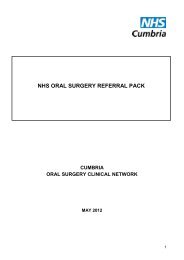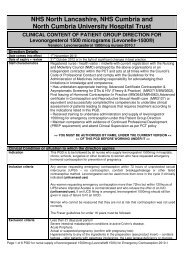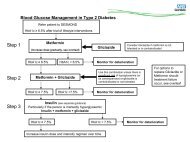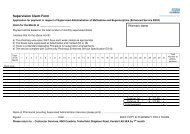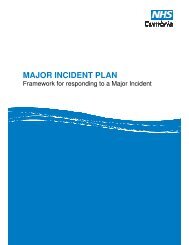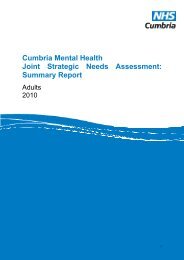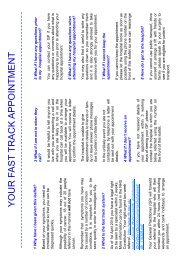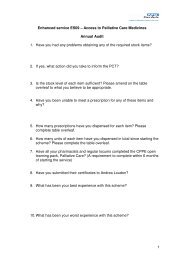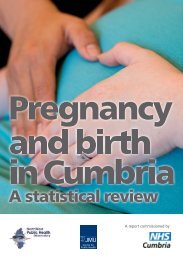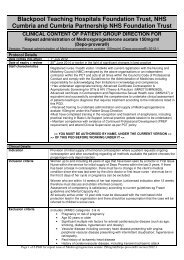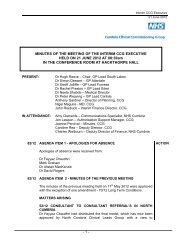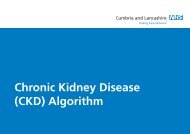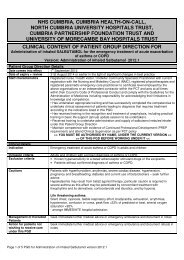FURTHER PRESCRIBER GUIDANCE FOR APIXABAN (Eliquis )Interaction with other medicinal products affecting haemostasisDue to an increased bleeding risk, concomitant treatment with any other anticoagulants iscontraindicated.Agents associated with serious bleeding are not recommended concomitantly with apixaban, suchas: thrombolytic agents, GPIIb/IIIa receptor antagonists, thienopyridines (e.g., clopidogrel),dipyridamole, dextran and sulfinpyrazone.Care is to be taken if patients are treated concomitantly with non-steroidal anti-inflammatory drugs (NSAIDs),including acetylsalicylic acid, especially in elderly patients because of a potentially higher bleeding risk.Following surgery, other platelet aggregation inhibitors are not recommended concomitantly with apixaban.In patients with atrial fibrillation and conditions that warrant mono or dual antiplatelet therapy, a carefulassessment of the potential benefits against the potential risks should be made be<strong>for</strong>e combining thistherapy with apixaban.In a clinical trial of patients with atrial fibrillation, concomitant use of acetylsalicylic acid increased the majorbleeding risk on apixaban almost 2-fold.In a clinical trial of high-risk post acute coronary syndrome patients, who received acetylsalicylic acid or thecombination of acetylsalicylic acid and clopidogrel, apixaban related major bleeding was reported to be twoand a half – fold higher than placebo.The use of Apixaban is not recommended in patients receiving concomitant systemic treatment with stronginhibitors of both CYP3A4 and P-gp, such as as azole-antimycotics (e.g., ketoconazole, itraconazole,voriconazole and posaconazole) and HIV protease inhibitors (e.g., ritonavir)No dose adjustment <strong>for</strong> apixaban is required when co-administered with less potent inhibitors of CYP3A4and/or P-gp such as diltiazem, naproxen, amiodarone, verapamil and quinidine.Co-administration of apixaban with rifampicin, a strong inducer of both CYP3A4 and P-gp, led to anapproximate 54% and 42% decrease in mean apixaban AUC and C max , respectively. The concomitant use ofapixaban with other strong CYP3A4 and P-gp inducers (e.g., phenytoin, carbamazepine, phenobarbital or St.John's Wort) may also lead to reduced apixaban plasma concentrations. No dose adjustment <strong>for</strong> apixaban isrequired during concomitant therapy with such agents, however strong inducers of both CYP3A4 and P-gpshould be co-administered with caution.Other concomitant therapiesNo clinically significant pharmacokinetic or pharmacodynamic interactions were observed when apixabanwas co-administered with atenolol or famotidine.Effect of apixaban on other medicinal productsApixaban is not expected to alter the clearance of co-administered drugs metabolised by CYP1A2, CYP2A6,CYP2B6, CYP2C8, CYP2C9, CYP2D6 or CYP3A4 (IC50 > 45 μM) CYP2C19 (IC50 > 20 μM)Apixaban is not a significant inhibitor of P-gp.In studies conducted in healthy subjects, as described below, apixaban did not meaningfully alter thepharmacokinetics of digoxin, naproxen, or atenolol.Spinal/epidural anaesthesia or punctureExperience with neuraxial blockade is limited and extreme caution is there<strong>for</strong>e recommended when usingapixaban. Prior to neuraxial intervention the physician should consider the potential benefit versus the risk inanticoagulated patients or in patients to be anticoagulated <strong>for</strong> thromboprophylaxis.To reduce the risk of thromboembolic complications, indwelling epidural or intrathecal catheters must be removedat least 5 hours prior to the first dose of apixaban. The risk of developing an epidural or spinal haematoma whichcan result in long-term or permanent paralysis may be increased by the post-operative use of indwelling epiduralcatheters or the concomitant use of medicinal products affecting haemostasis. Indwelling epidural or intrathecalcatheters must be removed at least 5 hours prior to the first dose of apixaban. The risk may also be increased bytraumatic or repeated epidural or spinal puncture. Patients are to be frequently monitored <strong>for</strong> signs and symptomsof neurological impairment. If neurological compromise is noted, urgent diagnosis and treatment isnecessary.There is no clinical experience with the use of apixaban with indwelling intrathecal or epidural catheters.In case there is such need, a time interval of 20-30 hours (i.e., 2 x half-life) between the last dose of apixaban andcatheter withdrawal should elapse, and at least one dose should be omitted be<strong>for</strong>e catheter withdrawal. The nextdose of apixaban may be given at least 5 hours after catheter removal.
There is no antidote to apixaban.Activated charcoal may be useful in the management of apixaban overdose or accidental ingestion.Overdose of apixaban may result in a higher risk of bleeding. If bleeding occurs, discontinue treatment andinvestigate the source of bleeding. The initiation of appropriate treatment, e.g., surgical haemostasis or thetransfusion of fresh frozen plasma should be considered.If life-threatening bleeding cannot be controlled by the above measures, administration of recombinant factor VIIamay be considered. However, there is currently no experience with the use of recombinant factor VIIa in individualsreceiving apixaban. Re-dosing of recombinant factor VIIa could be considered and titrated depending onimprovement of bleeding.As with other anticoagulants, patients taking apixaban are to be carefully observed <strong>for</strong> signs of bleeding. It isrecommended to be used with caution in conditions with increased risk of haemorrhage. Apixaban administrationshould be discontinued if severe haemorrhage occurs.Although treatment with apixaban does not require routine monitoring of exposure, anti-FXa assay may be useful inexceptional situations where knowledge of apixaban exposure may help to in<strong>for</strong>m clinical decisions, e.g. overdoseand emergency surgery.Prior to initiating apixaban, liver function testing should be per<strong>for</strong>med.Apixaban is contraindicated in patients with hepatic disease associated with coagulopathy and clinically relevantbleeding risk.It is not recommended in patients with severe hepatic impairment.It should be used with caution in patients with mild or moderate hepatic impairment (Child Pugh A or B).It should be used with caution in patients with elevated liver enzymes ALT/AST > 2 x ULN or total bilirubin ≥ 1.5 xULN as they were excluded from clinical trials.If a dose is missed, the patient should take apixaban immediately and then continue with twice daily intake as be<strong>for</strong>e.There are no data from the use of apixaban in pregnant women. Animal studies do not indicate direct or indirectharmful effects with respect to reproductive toxicity. Apixaban is not recommended during pregnancy.Breast-feedingIt is unknown whether apixaban or its metabolites are excreted in human milk. Available data in animals have shownexcretion of apixaban in milk. In rat milk, a high milk to maternal plasma ratio (C max about 8, AUC about 30) wasfound, possibly due to active transport into the milk. A risk to newborns and infants cannot be excluded.A decision must be made to either discontinue breast-feeding or to discontinue/abstain from apixaban therapy.FertilityStudies in animals dosed with apixaban have shown no effect on fertility.References:NICE TAG - 256SPC Xarelto® accessed via http://www.medicines.org.uk/emc/medicine/25586/SPC/Xarelto+20+mg+film-coated+tablets/<strong>NHS</strong> Fife Area DTC – March 2012NICE TAG 249SPC Pradaxa® accessed via http://www.medicines.org.uk/EMC/medicine/24839/SPC/Pradaxa+150+mg+hard+capsules/http://www.medicines.org.uk/EMC/medicine/20760/SPC/Pradaxa+110+mg+hard+capsules/NICE TAG 275SPC Eliquis® accessed viahttp://www.medicines.org.uk/emc/medicine/27220/SPC/Eliquis+5+mg+film-coated+tablets/http://www.medicines.org.uk/emc/medicine/24988/SPC/Eliquis+2.5+mg+film-coated+tablets/Acknowledgement: Somerset PCTAuthors: Lisa Rogan – <strong>NHS</strong> East Lancashire, Lesley Davey – <strong>NHS</strong> Lancashire CSUVersion 8Lisa Rogan on behalf of Lancashire and <strong>Cumbria</strong> Health Economy New Medicines and Treatments Group – September 2012Updated by Lesley Davey of Lancashire Medicines Management Group to include apixaban – May 2013 – Review Date - May 2015This guidance does not override the individual responsibility of health professionals to make decisions in exercising their clinical judgement in the circumstances of theindividual patient, in consultation with the patient and/or guardian or carer. For full prescribing in<strong>for</strong>mation please refer to the BNF and SPC ensuring correct SPCaccording to dose is consulted.



